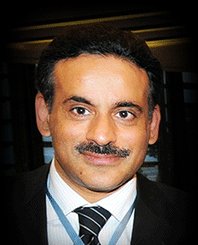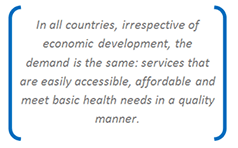HRH Leaders in Action Interview with Dr. Mubashar Sheikh
An interview series with HRH champions in developing countries produced by the HRH Global Resource Center.

Dr. Mubashar Sheikh is the Executive Director of the Global Health Workforce Alliance. He is a medical doctor and a specialist in health system policy and planning with professional experience of over two decades in the fields of health and development at national, regional and global levels. In his present capacity, he has played the lead role for the development of national policies and plans in 57 countries in Asia, Africa and Latin America aimed at ensuring that all people, everywhere, have access to skilled, motivated and supported health workers within a robust health system.
Could you briefly describe the path you took to your current position? How does that background support you as an HRH leader?
Most of my public health experience has been focused on the issues of equity and access to services, especially in rural and remote areas. I am from Pakistan originally, which is a country with very limited health coverage and a high burden of disease. One particular professional assignment I had there helped me to recognize the importance of health workforce issues. We started a community health worker (Lady Health Workers) program in the early 1990's to reach out to rural populations, particularly mothers and children, using community participation and female health workers to deliver essential health services that was closely linked to the overall health system and could overcome cultural, religious, and social barriers. There are now over 100,000 community health workers, and in each of the areas that have these health workers, all the indicators for major diseases and conditions are better than in other areas of the country.

This clarified for me how addressing health worker issues can result in better health outcomes, which has remained a focal point in my career. Before I came to the Global Health Workforce Alliance, I also worked in a number of other countries such as Egypt, Iran, Somalia, Yemen, Morocco and Tunisia where I continued to focus on health worker topics in the broader development context and work towards a multi-sectoral response.
Can you speak to the role of global partnerships in addressing the health worker crisis?
The health workforce crisis needs partnerships because the nature of the problem itself requires multi-sectoral interventions to solve it. It is important that all the stakeholders including the governments, private sector, civil society, academia, donors, and development partners come together with a common agenda to create synergies and opportunities. These partnerships can raise the profile of HRH issues and improve the conceptual base and evidence available for decision makers to facilitate policies at the country level that affect all areas of the health worker crisis. It is also critical that global partnerships don't work in a vacuum. Although they might be global in outreach, they must work closely with country- and regional-level stakeholders to be effectual and have a positive impact on health services.
What is the purpose of the Global Health Workforce Alliance (GHWA)?
GHWA brings partners together around a common mandate to address the HRH crisis. Its history began with work on HRH through processes such as the Joint Learning Initiative that culminated in the World Health Organization's 2006 World Health Report. The report documented for the first time the health worker crisis in its global perspective and highlighted countries that had critical health worker shortages. As a result of this report, the need was felt for a global alliance that could provide a neutral, broad-based platform for all the players to come together to advocate and catalyze global and country actions to resolve the HRH crisis. The Global Health Workforce Alliance was launched in 2006 at the World Health Assembly to fill this need, and we have since come a long way in bringing attention to health worker issues. GHWA has also contributed much through its members around its three primary functions: global advocacy, brokering knowledge, and convening its constituencies. GHWA continues to move forward with our vision that all people should have access to a skilled, motived, and supported health worker in a robust health system.
What do you think others—regional groups, governments, partners—expect from GHWA?
Because of its unique governing structure that includes members from various sectors, it provides the opportunity to bring similar partnerships and mechanisms together, so the expectations are quite high for GHWA to set a common agenda. I think the first global forum in Kampala was a good step forward. For the first time, the entire global health community came together and came out with common declaration, the Kampala Declaration, and six interconnected strategies to respond to the crises, the Agenda for Global Action. GHWA continues to represent its members and partners to bring attention to health workforce issues in the development of health strategies such as the post 2015 development agenda and universal health coverage. We also work at the highest political level to develop key messages that we can use for advocacy to ultimately ensure deliberations and outcomes on health giving HRH the attention that it is due.
What do you view as your most important lessons learned from your work as part of GHWA?
I would say the value of working with a broad-based partnership, which is quite unique. There are major challenges because constituents come with their own thoughts, perspectives and sometimes conflicting opinions, but it creates a healthy environment where people can share thoughts and ideas without losing the focus on HRH. Managing how we work together and push through a health systems approach has been an important learning curve for me professionally. Sustaining the network of members with different approaches and expectations can be a challenge, but it provides us with wonderful opportunities to benefit from each other's strengths and resources. I also believe that we should be using our resources to advocate for multi-sectorality at the country-level, inclusivity and outreach to frontline health workers. This has worked extremely well in the Alliance's country coordination and facilitation principles which we have used in 25 countries so far, and we hear very positive feedback from the countries on this approach.
What do you see on the road ahead for HRH?
We have come a long way, but the journey is not complete. The MDGs [Millennium Development Goals] are not achieved, particularly in health worker crisis countries, and we have to balance this with new realities such as the focus on non-communicable diseases that further strains the same overburdened health workforce. With the new discourse on universal health coverage and the post-2015 development agenda, we have an opportunity to advocate for health workforce issues and set targets that are reflective of all the challenges. We need to look beyond numbers to the gaps related to equitable distribution, competencies, quality, motivation, productivity and performance to create benchmarks and indicators that have broader application and can be monitored. GHWA is trying to put into place a system of accountability around a set of commitments to addressing the health workforce crisis. We hope that third global forum will provide more clarity and consensus about the explicit commitments of what health stakeholders can contribute, which we can advocate for inclusion in the post-2015 and universal health care agendas.
Past HRH Leaders in Action Interviews
- 1402 reads




